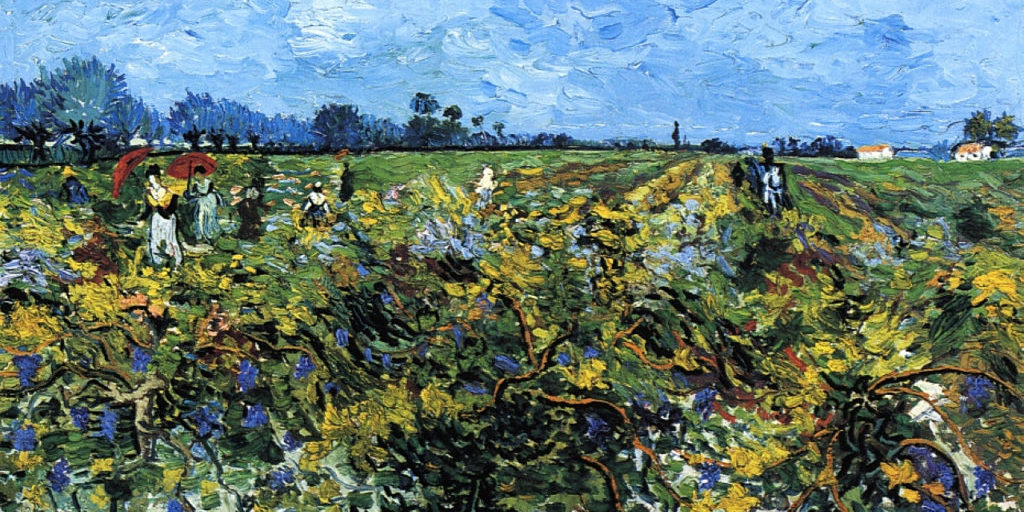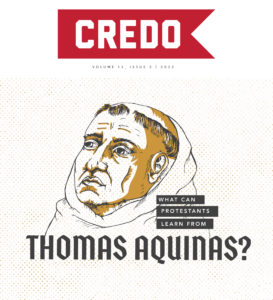
The God-Saturated Vision of Thomas Aquinas
The latest issue of C redo Magazine focuses on Thomas Aquinas. The following is one of the issue’s featured columns by Samuel G. Parkison. Dr. Parkison is associate professor of theological studies and director of the Abu Dhabi Extension Site at Gulf Theological Seminary in the United Arab Emirates.
redo Magazine focuses on Thomas Aquinas. The following is one of the issue’s featured columns by Samuel G. Parkison. Dr. Parkison is associate professor of theological studies and director of the Abu Dhabi Extension Site at Gulf Theological Seminary in the United Arab Emirates.
I was reminded of Thomas Aquinas on a recent occasion in a surprising way. That I thought of Thomas was not all that surprising; what was surprising was the context in which he came to mind. I wasn’t reading a book on theology or Church history, or contemplating the philosophical quandary of Being or anything like that. I thought of Thomas, rather, as I attended the funeral of a Baptist pastor from a small town. While the differences between this man and Thomas are almost innumerable, and while I cannot be sure of what either would say about their common association in my mind, I could not shake the connection. As I sat in the small, packed church building, singing hymns and thanking God for the witness of a faithful man and a race well-run, I was struck by two similarities between the Baptist pastor and Thomas: first, they were both, at that very moment, enjoying the blessed hope of the beatific vision they had spent so much of their lives looking forward to, and second, both of them considered it their greatest vocational calling to teach others the sacred scriptures, so as to instruct their listeners on the blessed hope of the beatific vision.
This aforementioned pastor once said that one of his favorite verses—and one that shaped his philosophy of ministry in a major way—was Jeremiah 3:15: “And I will give you shepherds after my own heart, who will feed you with knowledge and understanding.” I do not doubt that Thomas would conceptualize his own ministry in a similar manner. He sought to lead the people of God, and he sought to do that by feeding them with knowledge and understanding. Indeed, this Dumb Ox (as his adolescent schoolmates mockingly called him on account of his quiet and reserved disposition) has provided the people of God with a lifetime of feasting on knowledge and understanding.
In this essay, I hope to show that this association between a faithful, small-town, Bible-preaching Baptist pastor and the “Angelic Doctor” is not a stretch. I will argue that the two kinds of men belong together so long as they share a God-saturated vision of everything and a passion for faithfully teaching and preaching the scriptures. But before I can advance this argument positively, I have to anticipate some objections and head off some misunderstandings at the outset.
Repudiating and Appropriating Thomas
First, we should acknowledge up front that the differences between Protestant pastors (like the aforementioned Baptist pastor whose funeral I attended) and Thomas are simultaneously massive and often overstated. A great Reformation-sized chasm divides the two on a litany of issues in the realm of ecclesiology, anthropology, and soteriology. For example, the papacy, the veneration of icons, sacramentalism, transubstantiation, the priesthood, justification on account of infused righteousness, and more are all doctrinal distinctives that Thomas not only held to, but which he uniquely developed and advanced, and which no Protestant pastor can affirm whilst maintaining his Protestantism. These discrepancies are not insignificant. And yet, as crucial as these differences are, significant ties bind Thomas to virtually all major Protestant traditions and confessions, not the least being Theology Proper, Trinitarianism, and Christology. So many of the Post-Reformation theologians, including the Protestant Scholastics and even the Puritans, took Thomas as a good source on these topics straight down the middle, and their agreement with him on these foundational doctrines are codified in their confessions and catechisms.[1]
Indeed, even in those areas mentioned above where Protestants have always diverged clearly from Thomas, they did not always do so in an absolutely dismissive way. To take the most surprising example, even Thomas’s conception of infusion or infused habits was not regarded by the early Protestants as altogether useless. For Thomas, justification and sanctification was essentially the same thing. When God saves a sinner and grants him the gift of faith, he infuses that faith habit of righteousness, such that the believer’s justification is a process, one and the same with his sanctification. Obviously, this is untenable as a framework for justification for the Protestant who (rightly, I hasten to say) insists that the believer is justified on account of the imputed righteousness of Christ alone, received by faith alone.
So, no, the early Protestants insisted, we are not justified on account of the gracious infusion of Spirit-empowered righteous habits. But does that then mean that there is no category for a non-justifying infusion of Spirit-empowered righteous habits? John Owen did not think so; he simply detangled Thomas’s conception of “infused habits” from justification and employed it gladly as a way of understanding sanctification. Describing the position of the Reformed tradition, Owen writes, “That there is an habitual infused habit of Grace which is the formal cause of our personal inherent Righteousness they grant. But they all deny that God pardons our sins, and justifies our persons with respect unto this Righteousness as the formal cause thereof.”[2]
Thus, J.V. Fesko can say that “the Reformed theologians escorted [the concept of habit] away from the doctrine of justification and gave it a home in the doctrine of sanctification.”[3] Which is all to say, there is a sense in which Thomas belongs to Rome, and the distance contemporary Protestant pastors feel with the modern Roman Catholic Church today, they will understandably feel with Thomas. But we may be so bold as to say that Thomas does not exclusively belong to Rome, and even those areas where we differ from him should not be casually dismissed in a flippant manner. Thomas may be both appropriated and repudiated by Protestants, and sometimes even on the same topic.Thomas Aquinas may be both appropriated and repudiated by Protestants, and sometimes even on the same topic. Click To Tweet
A Renaissance
Second, we should acknowledge something of a renaissance of Thomas scholarship, which makes a second glance necessary. One of the reasons why my association between Thomas and a Baptist pastor may seem surprising is that for the longest time, Thomas was thought of almost exclusively as a theologically minded philosopher. It is understandable that this was the status quo for Thomas for a great many years, considering the fact that of the great glacier that is his body of work, the tip of the iceberg that was handed down from generation to generation, even in Roman Catholic circles, was a carefully curated selection of his philosophical writings. This gives the impression that he was first and foremost a natural philosopher. It is in this light that modern Protestant theologians will often decry Thomas for his “Nature/Grace Dualism.” But, as is mentioned in the introduction to their excellent book, Aquinas Among the Protestants, Manfred Svensson and David VanDrunen note how this is a mischaracterization. They acknowledge that “this sort of critique has sometimes rested upon an accurate perception of the kind of Thomism that one could find in contemporary Roman Catholicism,” but “as the thought of Aquinas himself has reemerged from the fruitful twentieth-century engagement with his work… interpreting Thomas [in this way] can only be regarded as a caricature.”[4]
A Fresh Look at Thomas
This moment in history is the richest one yet with regard to accessibility to Thomas’s corpus. To keep this in perspective: John Calvin and Martin Luther likely did not have the chance to read select quotes from Thomas (and sometimes those quotes were misrepresented to them by late medieval nominalists), let alone entire books by Thomas. But anyone reading this essay right now can open up a new tab and begin reading his entire Summa theologia in modern English. In fact, Thomas’s biblical commentaries are still, currently, being translated. What does that mean, practically? It means, in part, that many of the narratives and impressions about Thomas formed and propagated over the past couple hundred years are in the awkward situation of being confronted with a Thomas they misunderstood. It means that there is much secondary literature that has become debunked. And, relevantly, it means that many a favorite Protestant trope against Thomas may have to be retired.Many of the narratives about Thomas propagated over the past couple hundred years are in the awkward situation of being confronted with a Thomas they misunderstood. Click To Tweet
Of the several points of Thomas’s persona that have become clear with the renewed interest of his primary source material, we may say that, philosophically speaking, he was a synthesizer not only of Christianity and Aristotle, but also of Plato and Aristotle,[5] he was a thoroughgoing Augustinian,[6] and, above any other calling, he thought of himself as a theologian and an instructor of sacred scripture. The picture of Thomas we are often used to imagining—that of an austere man stuck in his own contemplations and unable and unwilling to simplify and communicate to a broad range of listeners—is one he himself would have found disappointing and baffling. In fact, he even refuted such an approach in the opening page of his Summa theologiae.
One of the features that made the then-novel order (the Dominicans) that Thomas joined as a young man so unique is that it moved away from the insularly monastic orders of previous eras to take on an outward-facing disposition. In other words, Thomas joined an order of preachers and teachers, tasked with educating future priests as well as laity, and refuting erroneous doctrine. The “O.P.” designation we find next to the names of some Roman Catholic authors is an indication of that man’s association with the same order Thomas joined, and it stands for “Order of the Preachers.” But the most significant feature of Thomas, and the one I wish to commend to Protestant pastors explicitly, is his God-saturated vision, and its implication on theological methodology.
Read the full article here!
Endnotes
[1] For example, see Richard Muller’s magisterial Post-Reformation Dogmatics.
[2] John Owen, The Doctrine of Justification by Faith, quoted in J.V. Fesko, “Aquinas’s Doctrine of Justification and Infused Habits in Reformed Soteriology” in Aquinas Among the Protestants, Manfred Svensson and David VanDrunen, eds. (Oxford, UK: Wiley Blackwell, 2018), 254.
[3] Ibid., 255.
[4] Manfred Svensson and VanDrunen, “Introduction: The Reception, Critique, and Use of Aquinas in Protestant Thought,” in Aquinas Among the Protestants, 4.
[5] See Sebastian Morello, The World as God’s Icon: Creator & Creation in the Platonic Thought of Thomas Aquinas (Brooklyn, NY: Anglico Press, 2020).
[6] Michael Dauphinais, Barry David, and Matthew Levering, eds., Aquinas the Augustinian (Washington, DC: Catholic University of America Press, 2007).

